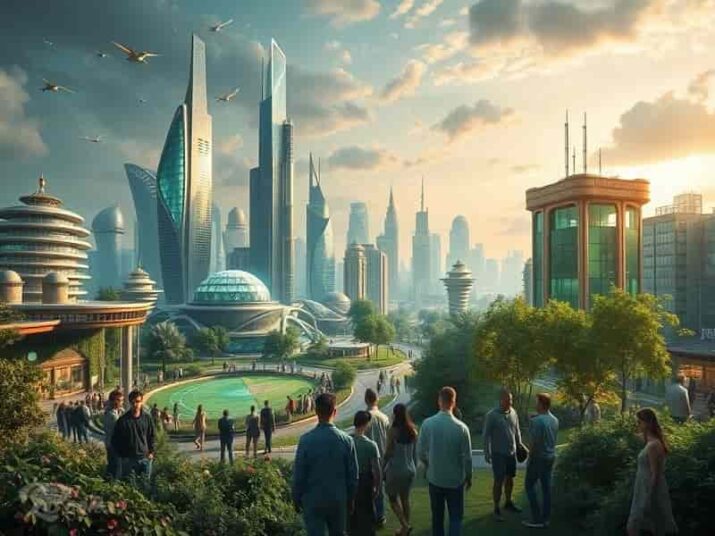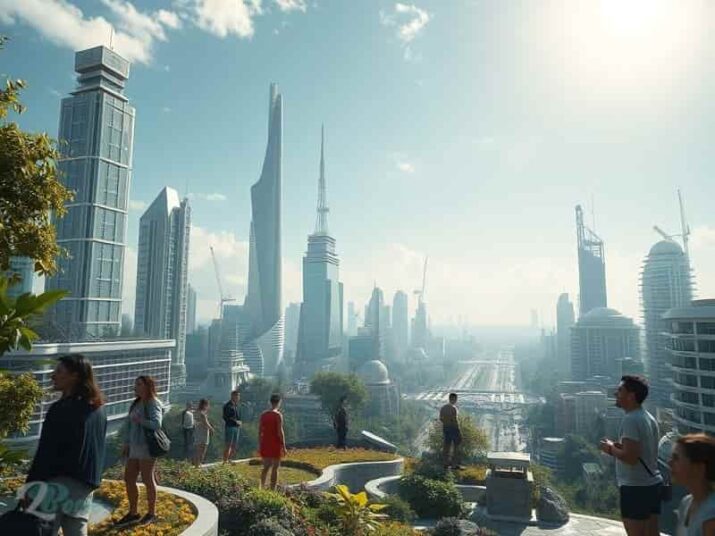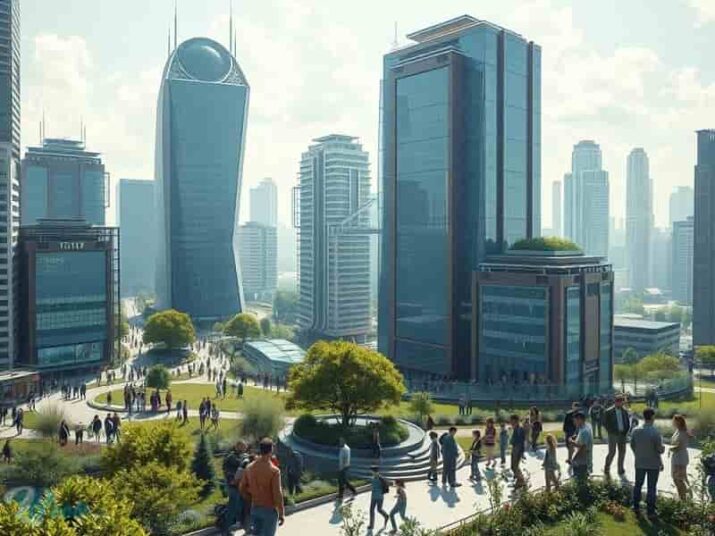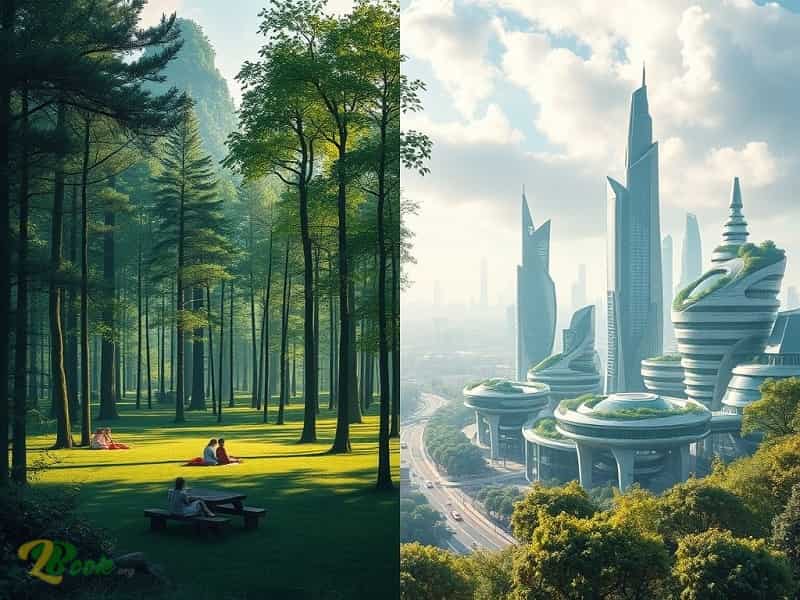Rebuilding Humanity in a World of Unknown Futures
The Unknown Future: How Do We Rebuild Humanity in Our World?
A Profound Introduction
Today, the world is in a state of chaos and instability, with crises unfolding to create a grim picture that reflects the decline of humanity. From political conflicts to environmental crises, and from economic disparities to social breakdowns, every aspect of our lives seems to suffer from the erosion of fundamental human values. Under these circumstances, the pressing question becomes: how can we rebuild humanity in a world heading toward the unknown?
These crises are intricately intertwined, complicating potential solutions. Understanding the connections between these challenges is a crucial step toward finding effective remedies. Therefore, we must begin by identifying these challenges and how they impact our daily lives.

Global Challenges
Environmental Crises
The Earth faces significant environmental challenges, ranging from climate change, which is causing radical shifts in our climate, to the loss of biodiversity that threatens ecosystems. Studies show that rising temperatures lead to an increase in natural disasters, such as floods and wildfires, which devastate communities and result in population displacement. The decline of humanity is evident here, as the poor are often the most affected by these changes, exacerbating social inequalities.
Activities such as deforestation and pollution are rapidly degrading the environment. Agricultural lands are damaged, and fresh water is becoming scarce, threatening food security in many countries. These crises not only affect nature but also directly impact humanity, leading to the loss of cultural and spiritual identity for many communities. Furthermore, environmental crises exacerbate health issues, increasing the prevalence of pollution-related diseases.
Political and Social Conflicts
Ongoing conflicts plague the world, with escalating tensions in various regions, from the Middle East to parts of Africa and Asia. These conflicts not only result in the loss of lives but also destroy communities and reshape cultural identities. In the context of the decline of humanity, violence is often used as a means to express social grievances, leading to further division and extremism.
These conflicts feed on feelings of frustration and despair, as many feel excluded from the decisions that affect their lives. The need for equality and justice is a primary factor driving communities to rebellion. It is essential to remember that peace is not a destination but a continuous process that requires effort and dedication. Promoting dialogue and understanding between different cultures is vital for achieving peace and stability.
Economic Disparities
Economic inequality has worsened significantly in recent years, with the rich getting richer while the poor becoming poorer. Statistics show that a small percentage of the population controls vast wealth, while others struggle to meet their basic needs. This economic gap fuels resentment and contributes to the decline of humanity, as many feel alienated from the economic system.
Poverty is not merely a lack of money; it is a state of social exclusion and deprivation of opportunities. Economic disparities hinder sustainable development, affecting education, healthcare, and economic opportunities. We must work on developing fair economic policies that ensure equitable wealth distribution. Supporting small and medium-sized businesses can help narrow the economic gap and promote local growth.
Health Crises
The COVID-19 pandemic has highlighted the fragility of health systems in many countries, revealing that gaps in healthcare expose lives to danger. Health crises are not just temporary phenomena; they also reflect poor planning and management. In the context of the decline of humanity, the most vulnerable groups, such as the elderly and people with disabilities, have suffered the most due to these crises.
Health systems need comprehensive rebuilding, including improving infrastructure and increasing investments in scientific research. Healthcare should be a right for every individual, not just a privilege for those who can afford it. Strengthening international cooperation to exchange knowledge and expertise is essential in addressing future health crises. We need to develop resilient health systems capable of rapid response to crises, focusing on prevention rather than treatment.
Pathways to Rebuilding
Promoting Awareness and Education
To rebuild humanity, we must start by raising awareness about the issues facing the world. We need to provide educational programs focused on human values, such as cooperation and empathy. The next generations must learn the importance of environmental conservation, achieving social justice, and collectively addressing challenges.
Education on human values is a crucial tool in shaping individual behaviors. This requires collaboration between educational institutions, families, and local communities. We must work on creating curricula that promote critical thinking and encourage youth to express their opinions and participate in decision-making. Online education and social media can be effective tools for spreading awareness and fostering dialogue between different cultures.
Innovation and Technology
Technology is a powerful tool that can be harnessed for the benefit of humanity. We should focus on developing sustainable technologies that address environmental crises, such as renewable energy sources. Technology can also improve healthcare through the use of artificial intelligence for disease diagnosis and treatment.
However, we must be cautious about the excessive or unethical use of technology, as it can exacerbate social and economic disparities. Thus, it is crucial to establish a legal and ethical framework governing the use of technology to ensure that everyone benefits. We should promote transparency and accountability in the use of technology, focusing on protecting individuals’ privacy and rights.

International Cooperation
Global challenges can only be addressed through international cooperation. Countries must collaborate to tackle crises, whether they are environmental, health-related, or economic. Strengthening cooperation between nations is a vital step toward achieving stability and security for all.
Such collaborations require creating dialogue platforms that bring together governments, NGOs, and the private sector. These platforms can facilitate knowledge and experience exchange and develop joint strategies to tackle challenges. We should work on strengthening partnerships between countries and local communities, as local solutions are often the most effective.
Reinforcing Human Values
We need to reassess the values we live by. Societies must reaffirm values of compassion, equality, and justice. It is essential to remember that the decline of humanity is not merely an individual phenomenon but a result of a global system in need of reform.
Reinforcing human values requires collective efforts from all members of society, including leaders, businesspeople, and artists. There should be ongoing dialogue about the importance of human values and how to promote them in everyday life. The arts and culture can play a significant role in spreading awareness and enhancing human values through literature, music, and cinema.
Recommendations
Education as a Tool for Change
There should be a greater focus on education that fosters critical thinking and social awareness. Educational curricula should address global issues and encourage students to take positive steps toward change. Education should include training programs that enhance leadership and collaboration skills.
Partnerships between educational institutions and the private sector should be established to provide training and professional development opportunities. Such partnerships can prepare individuals to face the challenges of a changing job market. We should also focus on promoting vocational and technical education to meet local economic needs.
Investing in Innovation
Governments and businesses should invest in research and development, particularly in clean energy and healthcare. Innovation can improve quality of life and reduce environmental impact. Incentives should be offered to encourage innovations that address social and environmental issues.
Startups are a key driver of innovation, so entrepreneurs should be supported through funding and mentorship. Incubators and accelerators can foster innovation and provide a supportive environment for new ideas.
Promoting Community Participation
Communities should be encouraged to participate in decision-making, whether at the local or national level. Effective participation can build trust and enhance human values. Platforms should be established for citizens to voice their opinions and engage in issues that affect their lives.
We should promote participatory democracy, where citizens have an active role in decision-making processes. Social media can facilitate dialogue and community engagement.
Supporting Vulnerable Groups
Clear strategies should be developed to support the most vulnerable groups in society, whether through economic support programs or healthcare services. We must ensure that everyone has access to basic opportunities for a dignified life. This requires collaboration between governments and NGOs to provide effective support.
Social support programs and health insurance can improve the quality of life for vulnerable populations. We must work to enhance access to essential services such as education, healthcare, and housing.
Promoting Culture and the Arts
The arts and culture are powerful tools for reinforcing human values. Artists and creators should be supported in expressing their issues and working toward social change. The arts can help build cultural identity and foster solidarity among communities.
Cultural and artistic events can be organized to raise awareness of human and social issues. We should encourage dialogue between different cultures, as this can enhance mutual understanding and peace.

Conclusion
The decline of humanity is a challenge that requires collective efforts from everyone. We need to rebuild societies on the foundations of cooperation, justice, and compassion. Through education, innovation, and international cooperation, we can confront challenges and build a better future for humanity. The road may be difficult, but hope exists, and the opportunity for change is present.
Let us begin now and make the future a place where everyone enjoys dignity and justice. The future of humanity depends on us, and through working together, we can achieve real and sustainable change. The challenges are significant, but with willpower and collaboration, we can overcome obstacles and build a better world for future generations. Let us all be part of this change and invest in creating a world that reflects true human values.





